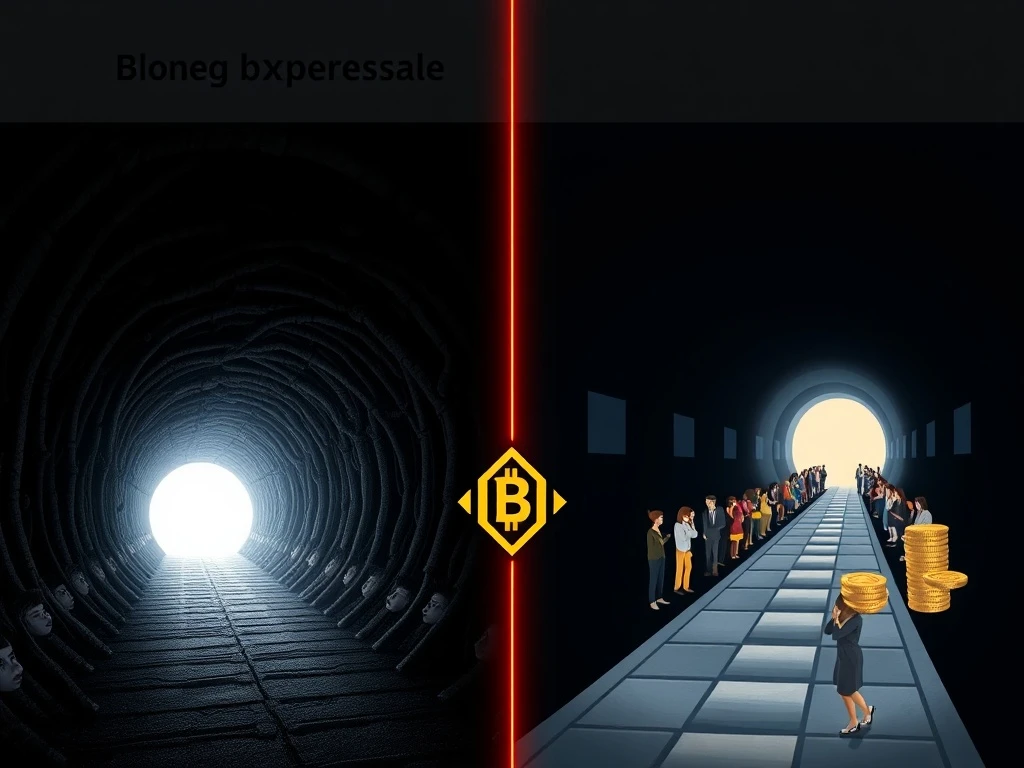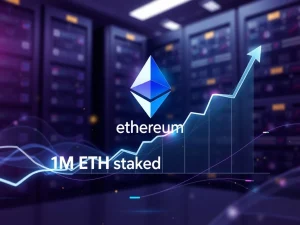Crypto Presale Unveiled: DeSoc’s $10M Triumph vs. BlockDag’s Alarming 18-Month Saga

In the dynamic world of cryptocurrencies, the approach to fundraising can make or break a project. The **crypto presale** model, once a beacon of early investment opportunity, is now under intense scrutiny. Investors are increasingly discerning, seeking transparency, utility, and tangible progress over speculative promises. This shift is starkly evident when comparing two recent projects: DeSoc, a rising star in the decentralized social space, and BlockDag, a project whose prolonged presale has ignited considerable debate. What can we learn from their divergent paths, and how do these stories reflect broader **crypto fundraising trends**?
The Evolving Landscape of **Crypto Presale** Strategies
The concept of a **crypto presale** is straightforward: offer tokens to early investors at a discounted rate before a public launch. This method provides projects with crucial capital for development and marketing. However, not all presales are created equal. The industry has seen a clear evolution, moving from hype-driven campaigns to a demand for solid fundamentals and clear roadmaps. Projects that prioritize community trust and real-world utility are gaining significant traction, setting a new standard for what investors expect.
**BlockDag Presale**: A Case Study in Controversy
The **BlockDag Presale** has become a focal point of criticism within the crypto community. Having been in its presale phase for over 18 months, the project faces mounting skepticism. Why the concern? Several factors contribute to the negative sentiment:
- Delayed Launch Dates: The prolonged fundraising period without a clear launch date raises questions about project execution.
- Lack of Transparency: Investors express frustration over insufficient information regarding development milestones and financial utilization.
- Negative User Sentiment: Reviews on platforms like Trustpilot show a 2.8/5 rating, with a significant 47% of feedback labeled as unfavorable, including serious accusations of fraud.
- Marketing Over Development: Critics suggest the project prioritizes extensive advertising and social media campaigns over actual innovation and product development.
- Indefinite Presale Model: While proponents argue this model sustains liquidity, detractors warn of potential over-issuance and token dilution, eroding long-term value.
This extended fundraising strategy, combined with a perceived lack of clarity, has significantly eroded trust among potential investors. The challenge for BlockDag lies in demonstrating tangible progress to justify its prolonged campaign and rebuild credibility in a trust-sensitive market.
**DeSoc Crypto**: A Model for Decentralized Social Success
In stark contrast to BlockDag, **DeSoc Crypto** has emerged as a beacon of transparency and utility in the burgeoning **decentralized social** (DeSoc) space. The project recently made headlines by successfully raising $10 million through a structured presale, signaling strong investor confidence. DeSoc’s appeal stems from its clear vision and practical application:
- Addressing Real-World Challenges: DeSoc aims to solve fragmentation in social media by enabling cross-platform content syndication via blockchain technology.
- Robust Tokenomics: The $SOCS token is designed with clear utility, rewarding content creators, facilitating microtransactions, and unlocking premium content. Of its 3 billion token supply, 45% is allocated to presale across 12 stages, 20% for development, and team tokens are locked for two years to prevent immediate dumping.
- Structured Presale: DeSoc’s phased allocation and clear utility-driven roadmap have resonated with investors seeking immediate value and proven development progress.
This disciplined approach positions DeSoc as a compelling alternative, highlighting the growing preference for projects with clear utility and a transparent path to market.
Comparing the Philosophies: BlockDag vs. DeSoc
The differing strategies of BlockDag and DeSoc offer a compelling look at contrasting philosophies in **crypto fundraising trends**. Here’s a quick comparison:
| Feature | DeSoc (Decentralized Social) | BlockDag |
|---|---|---|
| Presale Model | Structured, phased (12 stages), clear end | Prolonged (18+ months), ‘never-ending’ |
| Funds Raised | $10 Million (structured) | Undisclosed (implied ongoing) |
| Utility/Purpose | Cross-platform content syndication, creator rewards | Unclear, heavy marketing focus |
| Tokenomics | Transparent (45% presale, 20% dev, locked team) | Perceived lack of clarity, dilution risk |
| Investor Trust | High, seen as transparent & utility-driven | Low, 47% unfavorable feedback, fraud claims |
| Development Focus | Proven progress, addresses real-world issues | Prioritizes fundraising over innovation |
Shifting **Crypto Fundraising Trends** and Investor Priorities
The broader crypto landscape is witnessing a significant evolution in investor priorities. The days of investing solely based on hype are fading, replaced by a demand for demonstrable utility, transparent governance, and adherence to regulatory standards. Projects like DeSoc, with their clear roadmaps and tangible use cases, are gaining traction. This shift is also reflected in market dynamics, where even established players like Solana face price corrections, and innovative solutions like Unilabs Finance’s AI-driven tools draw attention. Regulatory clarity, underscored by recent ETF approvals for Solana-related assets, further emphasizes the importance of institutional trust. For any project, converting sustained fundraising into tangible platform utility without compromising token value is crucial.
The Promise of **Decentralized Social** and Beyond
The success of **DeSoc Crypto** underscores the immense potential of the **decentralized social** sector. As users grow increasingly concerned about data privacy, censorship, and centralized control on traditional platforms, decentralized alternatives offer a compelling vision for the future of online interaction. DeSoc’s focus on empowering creators and fostering a robust content ecosystem aligns perfectly with the core tenets of Web3. This project, alongside others that prioritize real-world problem-solving, is paving the way for a more equitable and user-centric digital landscape.
In conclusion, the contrasting fortunes of BlockDag and DeSoc serve as a powerful lesson in the evolving cryptocurrency market. While BlockDag’s prolonged **crypto presale** model faces severe scrutiny and skepticism, DeSoc’s structured, utility-driven approach has garnered significant investor confidence. This highlights a clear shift: investors are increasingly prioritizing transparency, tangible utility, and robust tokenomics over speculative promises. For projects aiming for long-term viability, building trust through demonstrable progress and clear communication is no longer optional—it’s essential.
Frequently Asked Questions (FAQs)
1. What is the main criticism against BlockDag’s presale?
BlockDag’s presale is primarily criticized for its prolonged duration (over 18 months), delayed launch dates, lack of transparency regarding development and funds, and a high percentage of negative user reviews (47% unfavorable) accusing it of fraud. Critics suggest it prioritizes marketing over actual product innovation.
2. How did DeSoc manage to raise $10 million successfully?
DeSoc raised $10 million through a structured presale by offering a clear utility proposition (cross-platform content syndication for decentralized social media), transparent tokenomics (e.g., locked team tokens, clear allocation for development), and a defined roadmap that resonated with investors seeking tangible value and progress.
3. What is ‘decentralized social’ (DeSoc) and why is it important?
Decentralized social (DeSoc) refers to social media platforms built on blockchain technology, aiming to address issues like data privacy, censorship, and centralized control found in traditional social media. Projects like DeSoc empower users and content creators, fostering a more equitable and open online environment.
4. What are the key differences in the presale strategies of BlockDag and DeSoc?
BlockDag employs a prolonged, “never-ending” presale model with perceived lack of clarity and utility. In contrast, DeSoc utilizes a structured, phased presale with clear stages, transparent tokenomics, and a strong focus on immediate utility and development progress, building investor trust through its clarity and purpose.
5. How are crypto fundraising trends evolving?
Crypto fundraising trends are shifting away from purely speculative projects towards those offering demonstrable utility, transparent governance, and clear roadmaps. Investors are prioritizing projects that address real-world problems, have robust tokenomics, and show a commitment to long-term development and regulatory compliance.










